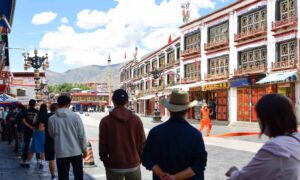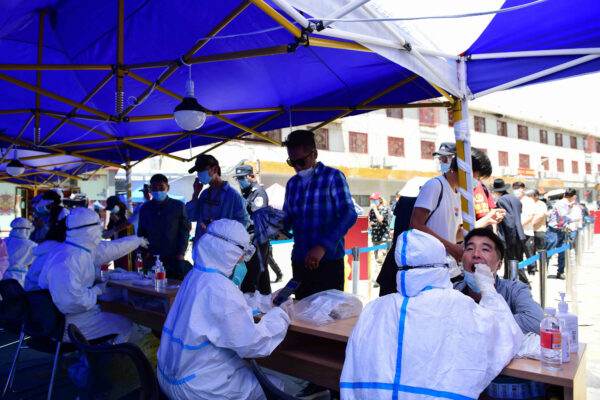Five Suicides in Tibet Due to ‘Extreme Hardship‘ in Lockdown: Report
The “extreme hardships” in Tibet, where the Chinese regime has imposed harsh lockdowns, are behind five recent suicides, according to a human rights advocacy group.The lockdown in the west border region—which has dragged on for over 50 days—caused “a spate of suicides” in Lhasa, the capital of Tibet, according to the Washington-based International Campaign for Tibet (ICT). From Sept. 23 to 24, “at least five people took their own lives by jumping to their deaths” in Lhasa, the group said in a Sept. 29 statement, citing unnamed sources in the city. ICT said that the suicides took place in centralized quarantine sites or residential buildings under lockdown. Lockdowns, sometimes on a citywide scale, have become frequent in recent months as the authorities across the country are on high alert to avoid outbreaks in the run up to the 20th Chinese Communist Party (CCP) congress later this month. During the twice-a-decade party conclave, Chinese leader Xi Jinping is seeking an unprecedented (since Mao Zedong) third five-year term in office. Tibet is experiencing the longest lockdown since Shanghai emerged from a two-month closure. Residents in certain towns across the vast Tibet region began receiving stay-at-home orders in early August, while the authorities conducted mass testing for COVID-19. “The Covid outbreak in Tibet has resulted in the expansion of already invasive and suffocating living conditions in Tibet,” ICT said. One person who killed himself was a man who jumped from a mass quarantine site, according to ICT. The group also shared several video clips obtained from its sources in the statement, but all footage has been removed by YouTube over violation of the platform’s terms of service. “The COVID suicides in Tibet are a manifestation of the CCP’s zero-COVID policy failure and the authorities’ rejection of Tibetan grievances and pleas to end the extreme response,” ICT said. No Food Posts describing how desperate conditions are under the strict lockdown—from food shortages, a lack of medical care, to chaotic scenes in quarantine sites—have appeared on China’s social media since September. “To save food, we could only sleep during the daytime,” a tour guide living in Lhasa who gave his surname as Zhao told The Epoch Times on Sept.16. “For over a month, I only eat once every day.” Zhao, who had been confined in a rental apartment for more than 30 days, said the authorities are censoring people’s voices, after their plight drew some attention on social media. People getting swabbed for nucleic acid testing for the COVID-19 coronavirus in Lhasa, Tibet on Aug. 9, 2022. (-/CNS/AFP via Getty Images) Such complaints prompted the city’s authorities to apologize publicly. Dradul, a deputy mayor of Lhasa, acknowledged that their mishandling of the outbreak “has had a great impact on the productivity and life of some of the people” during a press conference on Sept. 18. The ICT called it a “tactical” apology. The group stated that “no meaningful remedial measures have been implemented to ameliorate the harsh lockdown and quarantine conditions imposed by the official zero-COVID policy.” “China’s mismanagement of Covid in Tibet reveals the extreme human costs when authoritarian police states prioritize censorship and social control over the wellbeing of the people,” ICT said. No Income A small business owner said his friend’s relative committed suicide in a centralized quarantine center in Lhasa. While he didn’t know the details, he suggested that the economic pressures may have contributed. “How many people could stay calm after being deprived of income for 50 days?” a man, who gave his surname as Li, asked The Epoch Times on Sept. 27. Li said he had to pay off loans for his car and home and pay his staff, even though he was confined to his home, Tashi, a Lhasa resident who has been sealed in his home for over 45 days, said he lost his job and faced difficulties paying a car loan. He said he knows people who are unable to pay their rent. Tashi believes the authorities are using COVID-19 curbs to increase control over the far-western region. “Such restrictions are not for preventing the pandemic,” Tashi told The Epoch Times on Sept. 27. “They purposely force people to stay at home with the goal of cutting their income. In the end, people would do whatever the government asked, because they want to survive.” The ICT urged the Chinese authorities to “refrain from repressive measures.” “Tibetans living under Chinese rule have already suffered for decades as second-class citizens due to Beijing’s hardline policies targeting Tibetan identity, culture, language, and religion.” ICT said. “Beijing must recognize that the combination of decades-long repression and the rollout of new, extreme and inhumanely enforced COVID restrictions are causing Tibetan suffering and suicides.” Gu Xiaohua and Hong Ning contributed to the report. Follow Dorothy Li is a reporter for T

The “extreme hardships” in Tibet, where the Chinese regime has imposed harsh lockdowns, are behind five recent suicides, according to a human rights advocacy group.
The lockdown in the west border region—which has dragged on for over 50 days—caused “a spate of suicides” in Lhasa, the capital of Tibet, according to the Washington-based International Campaign for Tibet (ICT).
From Sept. 23 to 24, “at least five people took their own lives by jumping to their deaths” in Lhasa, the group said in a Sept. 29 statement, citing unnamed sources in the city. ICT said that the suicides took place in centralized quarantine sites or residential buildings under lockdown.
Lockdowns, sometimes on a citywide scale, have become frequent in recent months as the authorities across the country are on high alert to avoid outbreaks in the run up to the 20th Chinese Communist Party (CCP) congress later this month. During the twice-a-decade party conclave, Chinese leader Xi Jinping is seeking an unprecedented (since Mao Zedong) third five-year term in office.
Tibet is experiencing the longest lockdown since Shanghai emerged from a two-month closure. Residents in certain towns across the vast Tibet region began receiving stay-at-home orders in early August, while the authorities conducted mass testing for COVID-19.
“The Covid outbreak in Tibet has resulted in the expansion of already invasive and suffocating living conditions in Tibet,” ICT said.
One person who killed himself was a man who jumped from a mass quarantine site, according to ICT. The group also shared several video clips obtained from its sources in the statement, but all footage has been removed by YouTube over violation of the platform’s terms of service.
“The COVID suicides in Tibet are a manifestation of the CCP’s zero-COVID policy failure and the authorities’ rejection of Tibetan grievances and pleas to end the extreme response,” ICT said.
No Food
Posts describing how desperate conditions are under the strict lockdown—from food shortages, a lack of medical care, to chaotic scenes in quarantine sites—have appeared on China’s social media since September.
“To save food, we could only sleep during the daytime,” a tour guide living in Lhasa who gave his surname as Zhao told The Epoch Times on Sept.16. “For over a month, I only eat once every day.”
Zhao, who had been confined in a rental apartment for more than 30 days, said the authorities are censoring people’s voices, after their plight drew some attention on social media.

Such complaints prompted the city’s authorities to apologize publicly. Dradul, a deputy mayor of Lhasa, acknowledged that their mishandling of the outbreak “has had a great impact on the productivity and life of some of the people” during a press conference on Sept. 18.
The ICT called it a “tactical” apology. The group stated that “no meaningful remedial measures have been implemented to ameliorate the harsh lockdown and quarantine conditions imposed by the official zero-COVID policy.”
“China’s mismanagement of Covid in Tibet reveals the extreme human costs when authoritarian police states prioritize censorship and social control over the wellbeing of the people,” ICT said.
No Income
A small business owner said his friend’s relative committed suicide in a centralized quarantine center in Lhasa. While he didn’t know the details, he suggested that the economic pressures may have contributed.
“How many people could stay calm after being deprived of income for 50 days?” a man, who gave his surname as Li, asked The Epoch Times on Sept. 27. Li said he had to pay off loans for his car and home and pay his staff, even though he was confined to his home,
Tashi, a Lhasa resident who has been sealed in his home for over 45 days, said he lost his job and faced difficulties paying a car loan. He said he knows people who are unable to pay their rent.
Tashi believes the authorities are using COVID-19 curbs to increase control over the far-western region.
“Such restrictions are not for preventing the pandemic,” Tashi told The Epoch Times on Sept. 27. “They purposely force people to stay at home with the goal of cutting their income. In the end, people would do whatever the government asked, because they want to survive.”
The ICT urged the Chinese authorities to “refrain from repressive measures.”
“Tibetans living under Chinese rule have already suffered for decades as second-class citizens due to Beijing’s hardline policies targeting Tibetan identity, culture, language, and religion.” ICT said. “Beijing must recognize that the combination of decades-long repression and the rollout of new, extreme and inhumanely enforced COVID restrictions are causing Tibetan suffering and suicides.”
Gu Xiaohua and Hong Ning contributed to the report.













